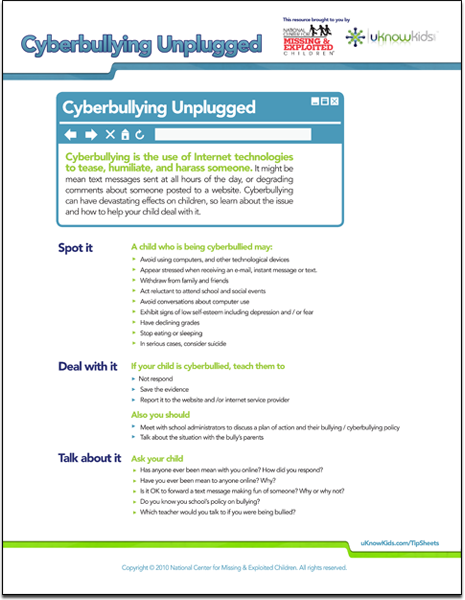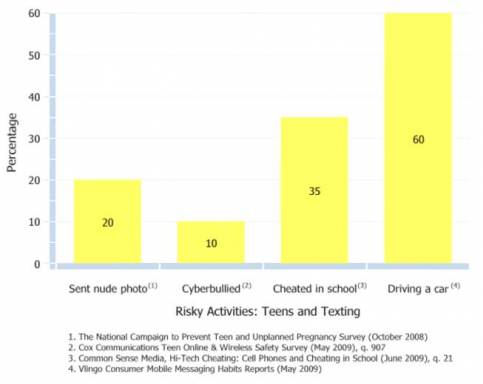Cyberbullying is the use of Internet technologies to tease, humiliate, and harass someone. It might be mean text messages sent at all hours of the day, or degrading comments about someone posted to a website. Cyberbullying can have devastating effects on children, so read below and learn about the issue and how to help your child deal with it.
Spot it: A child who is being cyberbullied may:
-
Avoid using computers, and other technological devices
-
Appear stressed when receiving an e-mail, instant message or text. Withdraw from family and friends










 YouTube provides a completely free platform for uploading, sharing, and viewing video content on any subject. You can laugh over a parody of Twilight, see your nephew take his first steps, learn how to seal the grout on your tile floor, or prove to your kids that an octopus can, in fact, fit through an opening the size of a quarter. Here’s what you need to know about using this
YouTube provides a completely free platform for uploading, sharing, and viewing video content on any subject. You can laugh over a parody of Twilight, see your nephew take his first steps, learn how to seal the grout on your tile floor, or prove to your kids that an octopus can, in fact, fit through an opening the size of a quarter. Here’s what you need to know about using this  Most people your child meets on the Internet will be harmless, but there’s still danger in making friends online.
Most people your child meets on the Internet will be harmless, but there’s still danger in making friends online. As the word
As the word  Would your teen start to get the shakes after 15 minutes if you took away the computer and all their Bluetooth-enabled devices? If so, it may be time to worry about their online usage’s impact on their mental health.
Would your teen start to get the shakes after 15 minutes if you took away the computer and all their Bluetooth-enabled devices? If so, it may be time to worry about their online usage’s impact on their mental health. I’m pleased to announce that MySpace has now been added to our service via the FamilyConnect platform. This new feature enables you to better educate, engage with and protect your child when they use the
I’m pleased to announce that MySpace has now been added to our service via the FamilyConnect platform. This new feature enables you to better educate, engage with and protect your child when they use the 
.jpg?width=231&height=154&name=Depositphotos_24869343_xs_(1).jpg) Sexting. To a parent’s ears, even the name is scary. Here are some of the straight facts about
Sexting. To a parent’s ears, even the name is scary. Here are some of the straight facts about  Photo sharing websites like Flickr, PhotoBucket, and Shutterfly are becoming extremely popular. Signing up for a free account only takes a few minutes, and then you can upload all your family pictures, add captions, and share them with friends and relatives. Photo sharing sites are a great way to stay in touch with out-of-state relatives or catch up with friends you don’t see very often. And let’s face it – pictures of your own kid are too cute not to showcase. But many parents are using photo sharing sites much too freely, and it may be compromising the
Photo sharing websites like Flickr, PhotoBucket, and Shutterfly are becoming extremely popular. Signing up for a free account only takes a few minutes, and then you can upload all your family pictures, add captions, and share them with friends and relatives. Photo sharing sites are a great way to stay in touch with out-of-state relatives or catch up with friends you don’t see very often. And let’s face it – pictures of your own kid are too cute not to showcase. But many parents are using photo sharing sites much too freely, and it may be compromising the  The cyberbullying-induced suicide of Massachusetts teen Phoebe Prince in March put cyberbullying back in the spotlight. Parents need to talk to their kids, not only about what to do if they are cyberbullied themselves but also how to stop it from happening to their peers and how to avoid becoming cyberbullies themselves.
The cyberbullying-induced suicide of Massachusetts teen Phoebe Prince in March put cyberbullying back in the spotlight. Parents need to talk to their kids, not only about what to do if they are cyberbullied themselves but also how to stop it from happening to their peers and how to avoid becoming cyberbullies themselves. You can help your child safely enjoy technology and steer clear of digital dangers such as predators,
You can help your child safely enjoy technology and steer clear of digital dangers such as predators, 